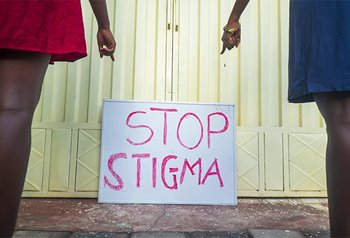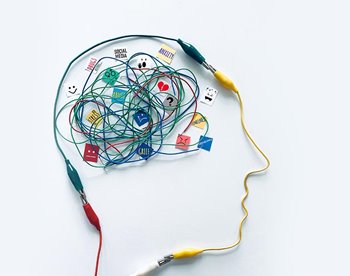Mental Health America reports that between 2019 and 2020, approximately 21% of American adults were experiencing a mental illness. That percentage translates to over 52 million Americans—1 in 5 adults—suffering from a mental illness. In other words, it is highly likely that someone—or several people—you know are currently struggling with mental health concerns.
Perhaps more surprising than the prevalence of mental illness in the United States, is the fact that over half—54.7%—of those living with mental illness don't receive help for their disorders. In the United States, there are several barriers that present to most people who are considering seeking mental healthcare, and can include shortages of mental health professionals in a given geographic area, not having the financial means or medical insurance, and/or not meeting insurance criteria for treatment that is deemed a "medical necessity."
However, perhaps one of the single most pervasive barriers to receiving mental health care—one that crosses racial, ethnic, gender and economic lines—is that of stigma. May is Mental Health Awareness Month, and this year Door County Medical Center is addressing stigma and its consequences.
What is stigma?
 Stigma is defined as, "A mark of disgrace associated with a particular circumstance, quality, or person." When discussed in the context of mental illness, stigma refers to the negative attitudes, beliefs, stereotypes, and prejudices that surround individuals who experience mental health challenges, and generally involves societal or cultural perceptions that marginalize and negatively label people based on their mental health condition, leading to discrimination and social exclusion.
Stigma is defined as, "A mark of disgrace associated with a particular circumstance, quality, or person." When discussed in the context of mental illness, stigma refers to the negative attitudes, beliefs, stereotypes, and prejudices that surround individuals who experience mental health challenges, and generally involves societal or cultural perceptions that marginalize and negatively label people based on their mental health condition, leading to discrimination and social exclusion.
Common examples of stigma are beliefs that view mental illness as a sign of weakness—that it is a character flaw or personal failing, or even a failing of one's upbringing or culture. At its worst, stigma attaches the illness or disorder to the person. Door County Medical Center's Behavioral Health Coordinator Barb Johnson-Giese MSW, LCSW, CSAC, ICS, points out, "Referring to someone by their behavioral health illness, such as 'she's bipolar' or 'he's alcoholic' tends to negatively label them as being their illness instead of having an illness." By way of comparison, she adds, "We don't refer to someone with a physical health illness as 'she's breast cancer' or 'he's Alzheimer's'".
The stigma surrounding mental health disorders is commonly divided into three categories by researchers. Per the American Psychiatric Association, these are:
-
Public stigma: which involves the negative stereotypes and attitudes people have about others—that those with mental health disorders are dangerous, incompetent, at fault for their condition, and unpredictable.
-
Self-stigma: which refers to negative attitudes people hold toward their own mental illness. Often linked to depression, self-blame, shame and guilt often lead to the internalized belief that one is personally at fault for their own mental health struggles.
-
Institutional stigma: which operates on systemic levels, encompassing policies enacted by government and private organizations that intentionally or unintentionally create barriers and restrict opportunities for individuals with mental illness. Examples include inadequate funding for mental illness research and a disproportionately lower allocation of resources to mental health services compared with other areas of healthcare.
 A comprehensive review of recent research has revealed that self-stigma alone significantly hampers the recovery process for individuals diagnosed with severe mental illnesses. The American Psychiatric Association notes these effects:
A comprehensive review of recent research has revealed that self-stigma alone significantly hampers the recovery process for individuals diagnosed with severe mental illnesses. The American Psychiatric Association notes these effects:
- Reduced hope
- Lower self-esteem
- Increased psychiatric symptoms
- Difficulties with social relationships
- Reduced likelihood of staying with treatment
- More difficulties at work
Beyond self-stigma, the medical journal The Lancet describes the negative effects of mental health stigma as moving beyond interpersonal issues—as "pervasive," and as affecting a diverse array of societal issues like "political enthusiasm, charitable fundraising, and availability and support for local services."
The costs and consequences of stigma
According to the National Alliance on Mental Health's (NAMI) 2021 Mood Disorder Survey, "The vast majority of all adults, 84%, agree that stigma is a major barrier to people accessing treatment for mood disorders, and 87% believe that mood disorders—if left untreated—have significant economic and social impacts."
However, in spite of an otherwise compassionate view of mental illness, NAMI also notes that 37% of those surveyed reported feeling fearful when around people with mood disorders. Additionally, the survey found that roughly, "3 in 5 people living with a mood disorder (61%) say that people treat them differently after they learn they have been diagnosed with a mood disorder, and about three-quarters (76%) say people around them do not understand what it's like to live with a mood disorder on a daily basis."
The barrier presented by these widespread views results in statistics like these: on average, the delay between the onset of mental illness symptoms and treatment is 11 years. Can you imagine waiting an average of 11 years to treat cancer or diabetes? The obvious answer is no. However, if that mindset was applied to other chronic medical conditions, the costs would be staggering.
Indeed, the impact of not treating mental illness to overall health has become well documented in recent years. A 2014 study released by Oxford University psychiatrists found that mental illnesses had the capacity to shorten life expectancy more than heavy smoking—that is, serious mental illness can reduce life expectancy by 10 to 20 years. In fact, mental illnesses increase the likelihood people will develop other serious and chronic medical conditions like diabetes, heart disease and cancer.
The economic costs of untreated mental illnesses are also well documented. According to NAMI, untreated mental illness costs the United States up to "$300 billion annually due to lost productivity and associated costs due to absenteeism, employee turnover and increases in medical and disability expenses."
Because stigma presents one of the biggest barriers to receiving treatment for a mental illness, the physical, emotional, economic, and societal costs of stigma are directly connected to the costs of untreated mental illness in general. And as noted above, those costs are indeed high.
Mental health care works—reducing mental health stigma
 "Mental health concerns," notes Johnson-Giese, "such as depression, should be viewed in the same manner as other health conditions, like heart disease or diabetes, to reduce the stigma of seeking help." In fact, like any other disease that affects the body, mental illness is highly treatable, usually with a combination of medication and therapy. On the positive side, NAMI notes, "Even while experiencing daily symptoms, more than 3 in 4 adults with a mood disorder (77%) feel [that with treatment] their symptoms are well-managed."
"Mental health concerns," notes Johnson-Giese, "such as depression, should be viewed in the same manner as other health conditions, like heart disease or diabetes, to reduce the stigma of seeking help." In fact, like any other disease that affects the body, mental illness is highly treatable, usually with a combination of medication and therapy. On the positive side, NAMI notes, "Even while experiencing daily symptoms, more than 3 in 4 adults with a mood disorder (77%) feel [that with treatment] their symptoms are well-managed."
With treatment so effective, breaking down the stigma barrier is more necessary than ever. NAMI outlines several steps we can all take to promote mental health awareness, fight stigma, and encourage support:
-
Foster open conversations about mental health: including sharing experiences with others in person and on social media platforms.
-
Educate yourself and others about mental health: by dispelling misconceptions and responding to negative comments with accurate information and personal stories.
-
Raise awareness about the importance of language: and remind people that their choice of words can impact those with mental health conditions.
-
Advocate for equality between physical and mental illnesses: emphasizing the need for equal support and understanding.
-
Show compassion and empathy: towards individuals dealing with mental illness, offering support and understanding rather than judgment.
-
Normalize mental health treatment: by discussing it openly and without shame, highlighting that seeking help is a crucial aspect of overall healthcare.
-
Engage with the media: provide feedback when stigmatizing language or portrayals of mental illness are used, encouraging more accurate and sensitive representation.
-
Choose empowerment over shame: by taking ownership of one's life and story, refusing to let others dictate self-perception or self-worth.
Warning signs of mental illness
 Mental illness is not a "one size fits all" type of disease, and each individual will present with different symptoms. Nevertheless, there are common warning signs that someone is developing a mental illness, which include: feeling sad or withdrawn for more than two weeks; out-of-control, risk taking behavior; marked weight gain or loss; extreme changes in mood; difficulty concentrating; and continuous and strong worries and fears that inhibit daily activities.
Mental illness is not a "one size fits all" type of disease, and each individual will present with different symptoms. Nevertheless, there are common warning signs that someone is developing a mental illness, which include: feeling sad or withdrawn for more than two weeks; out-of-control, risk taking behavior; marked weight gain or loss; extreme changes in mood; difficulty concentrating; and continuous and strong worries and fears that inhibit daily activities.
Door County Medical Center Behavioral Health provides several services for those experiencing behavioral health issues:
•
Reducing the stigma around mental health is a crucial step toward creating a more compassionate and inclusive society. Stigma, often rooted in misconceptions, fear, and ignorance, can perpetuate discrimination, shame, and isolation for individuals facing mental health challenges. However, by fostering understanding, empathy, and open dialogue, we can effectively break down these barriers and create an environment where seeking help and support for mental health is encouraged and embraced.
If you are, or anyone you know, needs mental health assistance, call the DCMC Behavioral Health Department at 920-746-0510 to schedule an appointment. You may also talk with your primary care provider about a referral to BH services.
If you are, or anyone you know, is experiencing mental health emergency, contact the Door County Crisis Line at 920-746-2588; Hope Text line: Text "HOPELINE" to 741741; call or text the National Suicide & Crisis Lifeline at 988, which provides free and confidential support for people in distress 24/7, or call 911.